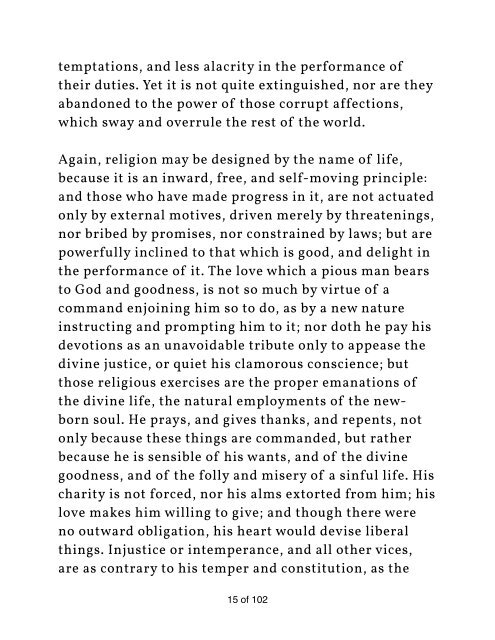The Life of God in the Soul of Man by Henry Scougal
The book instrumental in George Whitefield’s conversion The Life of God in the Soul of Man (1677), was originally written as a private letter to a ‘dear’ friend, to explain Christianity. It was never intended for publication. Yet it has become a classic Puritan text and one of the most read and influential treatises ever written for the comfort of God’s saints.
The book instrumental in George Whitefield’s conversion The Life of God in the Soul of Man (1677), was originally written as a private letter to a ‘dear’ friend, to explain Christianity. It was never intended for publication. Yet it has become a classic Puritan text and one of the most read and influential treatises ever written for the comfort of God’s saints.
You also want an ePaper? Increase the reach of your titles
YUMPU automatically turns print PDFs into web optimized ePapers that Google loves.
temptations, and less alacrity <strong>in</strong> <strong>the</strong> performance <strong>of</strong><br />
<strong>the</strong>ir duties. Yet it is not quite ext<strong>in</strong>guished, nor are <strong>the</strong>y<br />
abandoned to <strong>the</strong> power <strong>of</strong> those corrupt affections,<br />
which sway and overrule <strong>the</strong> rest <strong>of</strong> <strong>the</strong> world.<br />
Aga<strong>in</strong>, religion may be designed <strong>by</strong> <strong>the</strong> name <strong>of</strong> life,<br />
because it is an <strong>in</strong>ward, free, and self-mov<strong>in</strong>g pr<strong>in</strong>ciple:<br />
and those who have made progress <strong>in</strong> it, are not actuated<br />
only <strong>by</strong> external motives, driven merely <strong>by</strong> threaten<strong>in</strong>gs,<br />
nor bribed <strong>by</strong> promises, nor constra<strong>in</strong>ed <strong>by</strong> laws; but are<br />
powerfully <strong>in</strong>cl<strong>in</strong>ed to that which is good, and delight <strong>in</strong><br />
<strong>the</strong> performance <strong>of</strong> it. <strong>The</strong> love which a pious man bears<br />
to <strong>God</strong> and goodness, is not so much <strong>by</strong> virtue <strong>of</strong> a<br />
command enjo<strong>in</strong><strong>in</strong>g him so to do, as <strong>by</strong> a new nature<br />
<strong>in</strong>struct<strong>in</strong>g and prompt<strong>in</strong>g him to it; nor doth he pay his<br />
devotions as an unavoidable tribute only to appease <strong>the</strong><br />
div<strong>in</strong>e justice, or quiet his clamorous conscience; but<br />
those religious exercises are <strong>the</strong> proper emanations <strong>of</strong><br />
<strong>the</strong> div<strong>in</strong>e life, <strong>the</strong> natural employments <strong>of</strong> <strong>the</strong> newborn<br />
soul. He prays, and gives thanks, and repents, not<br />
only because <strong>the</strong>se th<strong>in</strong>gs are commanded, but ra<strong>the</strong>r<br />
because he is sensible <strong>of</strong> his wants, and <strong>of</strong> <strong>the</strong> div<strong>in</strong>e<br />
goodness, and <strong>of</strong> <strong>the</strong> folly and misery <strong>of</strong> a s<strong>in</strong>ful life. His<br />
charity is not forced, nor his alms extorted from him; his<br />
love makes him will<strong>in</strong>g to give; and though <strong>the</strong>re were<br />
no outward obligation, his heart would devise liberal<br />
th<strong>in</strong>gs. Injustice or <strong>in</strong>temperance, and all o<strong>the</strong>r vices,<br />
are as contrary to his temper and constitution, as <strong>the</strong><br />
15 <strong>of</strong> 102

















